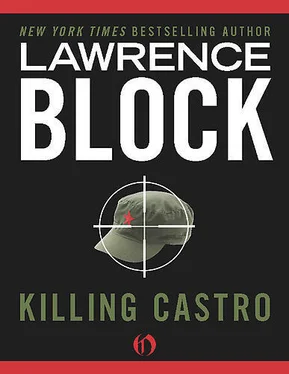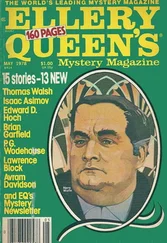In December of 1958 Fidel Castro was an outlaw, had been an outlaw for five and one-half years. In January of 1959 he was a national hero, an acknowledged leader. A greater man might have shaved his rebel beard, might have stepped down from the pedestal on which his country had placed him, might have denounced the Communists in his mushrooming band —as he had once accepted help from the Communists at the university and then turned against them—and then called at once for honest elections and for an end to terror. But most men would have done exactly what Fidel Castro did. Power was waiting, and he accepted it.
He was a hero now, known the world over. American magazines placed his picture on their covers. Cubans cheered his every word. Khrushchev fed his ego. The South American countries feared him. The United States, unfortunately, handled him with kid gloves, immobilized by concern over world opinion.
But Fidel charged forward, sure he was invincible, the man of the hour. Sure he had made promises, promises which seemed simple enough when he was a brigand in the hills of Oriente, broadcasting words of hope over the rebel station to hopeful listeners everywhere. But now that Batista was out and Castro was in, those same promises were much harder to keep than they had been to make.
In May of 1958 he had told Cuba: “Personally, I do not aspire to any post and I consider that there is sufficient proof that I fight for the good of my people, without any personal or egotistic ambition soiling my conduct. After the revolution we will convert the movement into a political party and we will fight with the arms of the constitution and the law. Not even then will I aspire to the presidency because I am only thirty-one years old.”
Had he meant that, or was it his way of blinding Cubans to his real purpose? At first, his words seemed genuine, for he appointed Manuel Urrutia as provisional president of Cuba, with general elections planned within the year. Then he deposed Urrutia and postponed those elections indefinitely. They were never held.
It seemed simpler to take the quick way, the easy way. He had the power and the nation was willing to follow wherever he led. Why bother with elections? Why wait for laws? He excused himself, saying that he would have to retain power until the revolution was a reality and until all reforms had been achieved. He kept his beard and went on wearing the uniform of a guerrilla fighter. Liberty and freedom could wait—or be shunted aside forever.
This was the first step, the suspension of the machinery of democracy. Next came the elimination of judicial processes. The country overflowed with former associates and lieutenants of Batista. Fidel had a simple answer. He put them before the firing squads. It was, once again, revolutionary justice. The term called into being with executions in the hills was revived now. Trials were dispensed with, the excuse being that they took time. Men were arrested quickly and systematically. They were brought before a revolutionary tribunal which pronounced them guilty. Then they were taken to the courtyard where the firing squad waited.
There were precedents, of course. The Committee of Public Safety, with its reign of terror that sent thousands to the guillotine in eighteenth-century France. The Russian Revolution, with mass executions of czarist officers. Castro called the process revolutionary justice, but it turned out to be another name for terror. He was no better than the man he had deposed—Batista.
The executions drew protest and alienated supporters, particularly in the United States. Fidel Castro could not understand the criticism. “Batista never gave anyone a trial,” he said. “He just had them killed, and there were no protests or criticisms then. These men are murderers, assassins. We are not executing innocent people or political opponents. We are executing murderers and they deserve to be shot.”
Perhaps they did, but Batista executed for the same reason—to kill opposition. And methods which are legitimate for a guerilla band are not legitimate for a government.
Just as Castro’s domestic policies gave democracy a back seat, so did his foreign policy draw him further and further from the United States. He had stated frequently that he would confiscate no foreign property, that he was not a Communist, that the United States was no enemy of his. But his position began to change. American business interests kept leveling a charge of Communism at Castro. The American press echoed this charge. Castro denied vehemently these accusations.
But he seized oil refineries and took over land owned by Americans. He accused the United States of crime after crime, using America as a convenient scapegoat to justify every extreme measure of his own. Every day saw him drawing further from the West and moving closer and closer to the Communist bloc. He saw an enemy in everyone who disagreed with him, a potential danger in every casual opponent.
He had thrown out a dictator. Now he had become a dictator himself. The Cuban people still backed him, still worshipped him. But the seeds of discontent had been sown.
Señora Luchar was talking. They were in the living room, she and Turner and Hines, and they were drinking the inevitable demitasse cups of strong black coffee. Hines couldn’t stand the coffee, or Señora Luchar, or Turner, or anyone else in the world, himself least of all. His fingers gripped the small white cup so tightly he was afraid it would break in his hand. He wished he was a smoker; a cigarette would be good right now, but it seemed a silly time to start.
“Today is the twentieth of July,” Señora Luchar was saying. “Tomorrow Castro makes his trip across the island. Thursday he speaks in Santiago, a speech to workers and peasants. Then he returns here, to Havana, in time for his speech commemorating the anniversary of the Twenty-sixth of July Movement. He’ll be speaking Sunday, in the main square. That’s not far from here. You know where it is?”
Hines nodded.
“So that’s the time,” the Luchar woman said. “There will be a huge crowd, too huge for the police to do much good. You’re using bombs, right? Bombs that you throw?”
“That’s right,” Hines told her.
“So you mingle with the crowd and throw the bombs. Then you get away and return here. We’ll get you back to the mainland.”
“It sounds shaky,” Turner broke in.
“Mr. Turner?”
“Yeah,” Turner went on. “Yeah, it sounds shaky. We’re right in the middle of it. It’s not tough tossing the bombs. It’s tough getting away.”
The woman looked at him.
“We’re taking a chance,” Turner said.
“Of course. And you are being paid how much to take this chance? Twenty thousand dollars? You would not be paid so much if there were no chance, Mr. Turner.”
She turned, left them. Turner shrugged and headed for the stairs to the basement. Hines got up, not particularly anxious to follow Turner. But where the hell else was he supposed to go?
Turner said: “What do you think of the setup?”
“I don’t know.”
“We’ll be sitting ducks. If we play it the way she calls it, we’ll be deader than hell before the bomb goes off. I don’t like it.”
“So?”
Turner hesitated, then stated boldly, “I want out, Jim.”
“You must be kidding.”
“No, I mean it.”
“You?” Hines was on his feet now, his eyes amazed. This was too much, he thought. Big old Turner, tough guy Turner, the desperate desperado. He wanted out.
“Me.”
“Why? Getting cold feet, for God’s sake? Going chicken?”
“Uh-huh.”
Читать дальше












